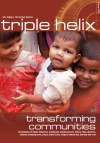Sperm surgery
Intracytoplasmic sperm injection (ICSI) could become a more successful fertility treatment with the introduction of a new technique. The present procedure gives men with low sperm counts the chance of fatherhood, but there are concerns that the introduction of the acrosome (which covers the head of the sperm) into the egg may damage the embryo. A study using mice at the University of Hawaii, reported in Proceedings of the National Academy of Sciences, found that acrosomal enzymes reduce the rate of embryo development. During natural fertilisation these enzymes help the sperm penetrate the egg but without introducing the acrosome into the egg. The study found that removal of the acrosome before injection prevented embryo damage and it is hoped the ‘take-home baby rate’ will increase if this technique is used. (Daily Telegraph 2005; 26 September)
Dutch slippery slopes
New guidelines are expected to go before the Dutch parliament in October, formally permitting doctors to perform euthanasia on infants deemed to be terminally ill. Opponents of infant euthanasia have warned that the practice could be extended to mentally incapacitated patients who are also unable to give their consent. The Netherlands passed euthanasia legislation 10 years ago. (The Guardian 2005; 30 September; quoted in SPUC Digest)
Euthanasia test for Supreme Court
The US Supreme Court’s first case under new Chief Justice John Roberts concerns assisted suicide. The federal government argues that a law in the state of Oregon allowing terminally ill patients to end their own lives should be overturned. The court’s ruling will have implications across the US but a report is not expected until June. (news.bbc.co.uk)
Red Cross supplanted by Red ‘Crystal’
The International Committee of the Red Cross intends to allow national first aid societies to use a red ‘crystal’ in the place of a cross or a crescent if they object to these symbols. Israel’s first aid and ambulance organisation has been campaigning for a change and would be able to join the movement if the red crystal is approved in Geneva later this year. The International Committee said the new emblem would be ‘free of any perception of religious, political, or other connotation’. It would ‘enable national societies that have not been able to use the existing emblems to become full members’. (BMJ 2005; 331:654) Eutychus wonders if some people might interpret the crystal as a ‘New Age’ symbol.
Euthanasia doctor is struck off
A doctor who tried to ‘help’ a terminally ill friend die has been struck off the medical register by the General Medical Council. ‘Right-to-die’ campaigner and former VES Chairman Dr Michael Irwin, from Surrey, admitted obtaining benzodiazepine sleeping pills to help his friend die, but denied the misconduct charge. The 74- year-old has already received a police caution for his actions. A GMC panel said his actions were irresponsible, and found him guilty of serious professional misconduct. (news.bbc.co.uk)
New German euthanasia programme
The Swiss assisted-suicide organisation Dignitas has opened an office in Germany. Since it was founded in 1998, some 453 people have been helped by Dignitas to end their lives, approximately half of them from Germany. The opening of the office in Hanover has sparked strong criticism from the Bishop of Hanover and the Justice Minister of Lower Saxony. Ludwig A Minelli, who founded Dignitas, said that the new office would push the assisted suicide debate in Germany, where the practice is currently illegal. (Deutsche Welle 2005; 29 September; quoted in SPUC Digest)
Condom promotion in Uganda not reducing HIV risk
A study of condom distribution and promotion in Uganda has failed to support the view of some commentators that the dramatic fall in the incidence and prevalence of HIV/AIDS in the country was due to condoms rather than abstinence. The authors note that whilst the uptake of condoms was much higher among the intervention group, proving that the intervention had overcome barriers to access, this improvement in uptake actually appeared to be associated with an increase in behaviour that may paradoxically increase the rate of HIV transmission in sexual networks with high levels of partner change. (J Acq Immune Defic Syndr 2005;40(1):77-82) Paradoxical rises in the incidence of STDs with condoms has previously been described as ‘the seat-belt phenomenon’. People wearing seatbelts feel safer, so end up driving more dangerously (Lancet 2000; 355:400-3)
Sculpture gives pause for thought
Alison Lapper Pregnant is a giant, white Italian marble statue of a pregnant disabled woman that now occupies the fourth plinth in Trafalgar Square. The work by Marc Quinn has been praised for highlighting the great inner strength of the model who has fought to gain acceptance in a world dominated by the able-bodied. But a BMJ article suggests that it may engender a feeling of guilt in doctors because of the association of phocomelia with thalidomide, even though the drug was not relevant in Alison’s case. (BMJ 2005; 331:849, 8 October) Eutychus wonders if it might spark some selfexamination over the medical profession’s involvement in abortion for handicap, which was initially fuelled by the thalidomide disaster of the early 1960s.































